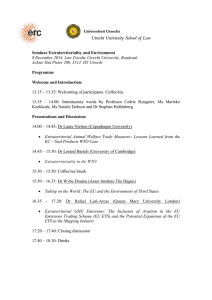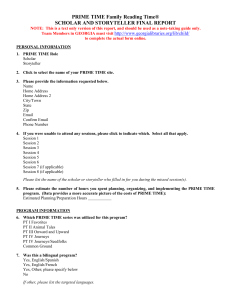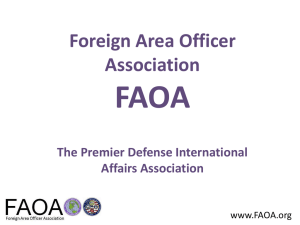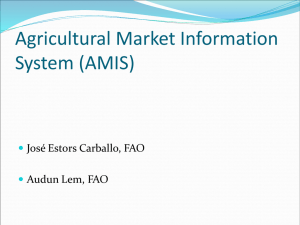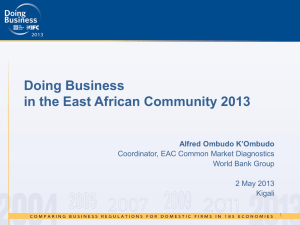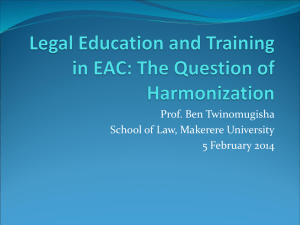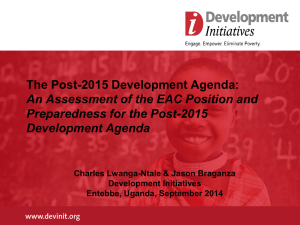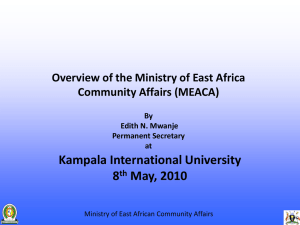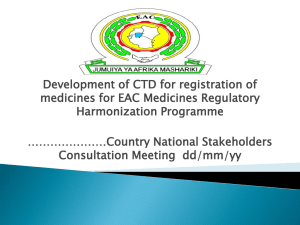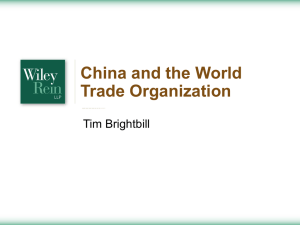Training Needs Assessment of Relevant Stakeholders
advertisement
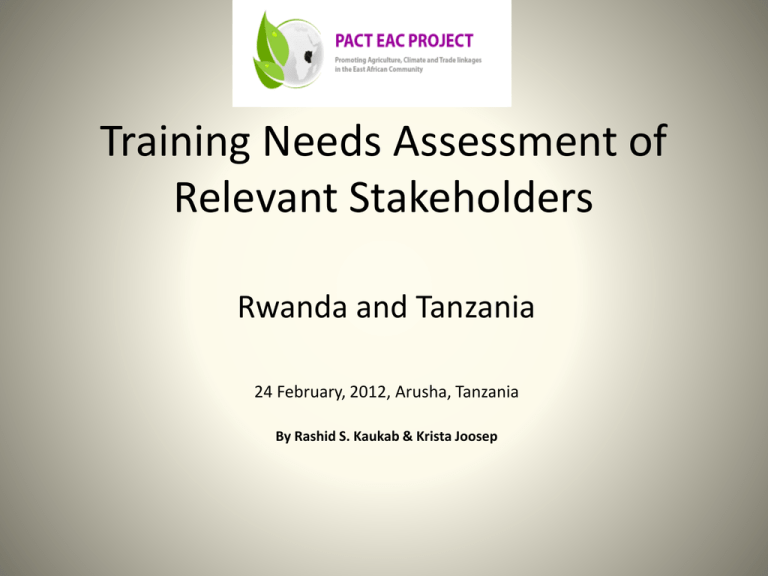
Training Needs Assessment of Relevant Stakeholders Rwanda and Tanzania 24 February, 2012, Arusha, Tanzania By Rashid S. Kaukab & Krista Joosep Objectives of the Trainings Purpose of training: building capacity of a critical mass of representatives of stakeholders on climate change-food security-trade issues Objectives achieved through training: • Increased knowledge on issues • Increased capacity to develop and implement policies Collaboration: TRAPCA, FARA, AFAAS Training outputs: • Three regional training workshops • Ten national training workshops (two in each EAC country) 2 Training Offered by International Organizations Climate Change: • The Capacity Development for Adaptation to Climate Change & GHG Mitigation in Non-Annex I Countries (UNITAR) • Climate Change Diplomacy Online Course (UNCCLEARN) • Country Pilot Projects to Strengthen Human Resources, Learning and Skills Development to Address Climate Change (UNCCLEARN) • Strategic planning for adaptation to climate change (INTER-CEPT) • CLIMAFRICA - Climate change predictions in Sub-Saharan Africa: Impact and Adaptation (UNFCCC) • Capacity Development on Climate change (FAO) Food Security and Trade: • Food Security: Can Trade and Investment improve it? (UNITAR/WTI) • Assessing Impact of Development Programs on Food Security (FAO) Food Security and Climate: • Several FAO learning services on Capacity Development on Climate Change (FAO) • The e-learning tool 'Planning for Community Based Adaptation (CBA) to Climate Change‘(FAO) Trade: • Netherlands Trainee Program (EUR 3.9 million to training for least developed countries) 2012-2015 on trade related issues • WTO Technical Assistance and Training Plan 2012/2013 (Upcoming) • Short Trade Policy Courses (STPCs) on trade negotiation skills (WTO) • General courses on intellectual property (WIPO) 3 Broad Information on Respondents Countries: Rwanda and Tanzania: Respondents to the questionnaire: 55% NGOs, 20% government, 15% farmers’ orgs, 10% private sector Working with specific subject matter: • • • • • 10% in trade and climate change 30% in trade and food security 10% food security and climate change 30% in trade-food security-climate change 20% other 4 • Highest-ranking believed causes of food insecurity in the EAC region 1. High weather variability 2. Inadequate food trade between deficit and surplus areas 3. Low agriculture productivity 5 Awareness of the Following National and Regional Policies National or regional policy Awareness National Adaptation Programme of Action (NAPA) 5 National Trade Policy/Strategy of your country 11 National Food Security Policy of your country 11 EAC Climate Change Policy 6 EAC Common Market Protocol 12 EAC Climate Change Master Plan and Strategy 3 EAC Food Security Action Plan (2011-2015) 6 EAC Agriculture and Rural Development Strategy 8 6 Familiarity with regional policy-making processes 30 25 20 5 0 Trade Agriculture Somewhat familiar 10 Familiar Familiar 15 Somewhat familiar Responses in % Very familiar Somewhat familiar Little familiar Not familiar Climate Change Mitigation and Adaptation 7 Familiarity with national-regional policy linkages …with regard to policy design and implementation related to trade, food security and climate change 25 10 Little familiar 15 Very familiar Somewhat familiar Responses in % 20 5 Familiar Somewhat familiar Little familiar Not familiar 0 Familiarity with national-regional linkages in policy design 8 Familiarity with drought resistant seeds and credit programs …and their potential for improving food security In the face of climate change 35 Very familiar 30 Familiar 25 20 15 10 Somewhat familiar Responses in % 40 Somewhat familiar Little familiar Not familiar 5 0 9 • How to improve implementation of relevant policies at the national and regional levels 1. Better institutional coordination 2. Multi-stakeholder involvement 10 Familiarity with the workings of these international organizations 30 Very familiar 25 Familiar Somewhat familiar 20 10 5 Not familiar 15 Little familiar Little familiar Little familiar Responses in % 35 Not familiar 0 FAO WTO UNFCCC 11 Familiarity with the Following WTO, FAO, UNFCCC Agreements and Instruments 60 Responses in % 50 40 30 20 10 0 WTO TRIPS WTO AoA WTO SPS, TBT WTO Negs on Envirn. Very familiar FAO Resos. on food security Familiar IUPGR LTCA JI & CDM Somewhat familiar Carbon Kyoto Emissions Protocol Market Little familiar UNFCCC COPs Not familiar 12 Familiarity with international Public Financing Initiatives available to the EAC region to adapt to climate uncertainties Very familiar 20 15 10 5 Familiar Not familiar Responses in % 25 Somewhat familiar Little familiar Not familiar 0 Familiarity with financing mechanisms 13 Expressed Training Needs Most important training needs on issues related to climate change, food security, and trade: • Training on practical matters • Training on policy matters Most effective format for training: • Case studies • Group workshops • Presentations Assess learning level of participants after training : • 100 % say YES 14 Asante Sana! For More Information Please Visit: www.cuts-geneva.org/pacteac 15


